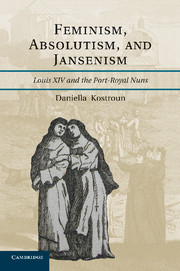Book contents
- Frontmatter
- Contents
- Acknowledgments
- Abbreviations
- Introduction
- 1 Jansenism as a “Woman Problem”
- 2 Controversy and Reform at Port-Royal
- 3 Jansenism's Political Turn, 1652–1661
- 4 The Limits to Obedience, 1661–1664
- 5 A Feminist Response to Absolutism, 1664–1669
- 6 The Unsettled Peace, 1669–1679
- 7 A Royal Victory, 1679–1709
- Conclusion
- Bibliography
- Index
- References
5 - A Feminist Response to Absolutism, 1664–1669
Published online by Cambridge University Press: 05 August 2011
- Frontmatter
- Contents
- Acknowledgments
- Abbreviations
- Introduction
- 1 Jansenism as a “Woman Problem”
- 2 Controversy and Reform at Port-Royal
- 3 Jansenism's Political Turn, 1652–1661
- 4 The Limits to Obedience, 1661–1664
- 5 A Feminist Response to Absolutism, 1664–1669
- 6 The Unsettled Peace, 1669–1679
- 7 A Royal Victory, 1679–1709
- Conclusion
- Bibliography
- Index
- References
Summary
In April 1664, after two years of tense diplomatic relations between Louis XIV and Pope Alexander VII, the pope finally approved Hardouin de Péréfixe's nomination as archbishop of Paris. This nomination took place at the same time that proponents of papal infallibility and royal absolutism were making their most assertive claims ever about the authority of these powers. According to Pierre de Marca's political theory, this parallel concentration of power in the French monarchy and the papacy was supposed to reduce tensions between the two powers. However, in reality, relations remained tenuous as each power jealously guarded its authority and feared the slightest infraction from its rival.
In 1664, one source of tension between these powers was the debates over the doctrine of papal infallibility that took place after the faculty of the Sorbonne condemned a thesis defended at the Jesuit college of Clermont that supported this doctrine. These debates alerted Louis XIV to the danger this doctrine posed to him both domestically and internationally. At home, Louis XIV worried that some bishops and magistrates might seize on the threat of this doctrine as an excuse to renew their resistance to the Crown's anti-Jansenist policies in the name of Gallican liberties. In the international arena, the king worried that the doctrine granted the pope rights to control the temporal arm of the French Church, a right traditionally coveted by French kings.
- Type
- Chapter
- Information
- Feminism, Absolutism, and JansenismLouis XIV and the Port-Royal Nuns, pp. 141 - 181Publisher: Cambridge University PressPrint publication year: 2011



